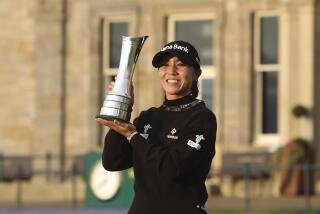ON SITE
- Share via
1954
Winner: Peter Thomson
Royal Birkdale was supposed to be the Open venue in 1940 until World War II intervened.
Ben Hogan, who won his only Open in 1953 at Carnoustie, decided against a transatlantic trip to defend his title, but Thomson, an Australian, fast became a favorite.
Thomson was runner-up the previous two years--to Bobby Locke in 1952, and he joined Dai Rees, Antonio Cerda and Frank Stranahan in finishing four strokes behind Hogan a year later.
Thomson finished at 283 for a one-stroke victory over Rees, Locke and Sidney Scott. It was the first of three consecutive Open championships for Thomson, the first to do that since Bob Ferguson from 1880-82.
*
1961
Winner: Arnold Palmer
A year after Palmer made his debut in the British Isles with a runner-up finish at St. Andrews, he helped to reestablish the importance of golf’s oldest championship by winning at Birkdale.
It wasn’t easy.
The wind blew so hard in the first round that it toppled most of the tented village. If that wasn’t enough, Palmer called a penalty stroke on himself when his ball, unseen by others, moved in a bunker.
He won the tournament on the 16th hole, where a plaque commemorates the kind of shot that defined Palmer’s career. His ball buried in the willow scrub and buckthorn, he lashed at it with a six-iron and flew the ball to the green, where he saved par.
He finished with a 284 and a one-stroke victory over Rees, who birdied three of the last four holes but had to settle for his second runner-up finish at Birkdale.
*
1965
Winner: Peter Thomson
Americans were coming over to the British Open in droves when it returned to Birkdale four years later, but the stage again belonged to Thomson.
Thomson won his fifth Open in a span of 12 years, joining James Braid and J.H. Taylor with five titles, one behind the record six of Harry Vardon.
Thomson, 35, took control with a 68 in the second round and went on to finish with a 285 and a two-stroke victory over Brian Huggett and Christy O’Connor Jr.
*
1971
Winner: Lee Trevino
At the 100th championship, Trevino became only the fourth player to win the U.S. Open and British Open in the same year.
It was the first of consecutive British Open titles for Trevino, and his finish proved that no lead is safe at Birkdale. Leading by three strokes with two holes to play, Trevino got caught in the sand hills along the par-five 17th and wound up with a double bogey.
But Lu Liang Huan of Taiwan, fondly christened “Mr. Lu” by the British gallery, could not take advantage of Trevino’s slip. Trevino managed to par the 18th for a 278 and a one-stroke victory.
*
1976
Winner: Johnny Miller
Miller won his second major with a brilliant finish. Trailing by two strokes going into the final round, he closed with a 66, the lowest closing round by a British Open champion at the time.
It was reminiscent of his final-round 63 to win the U.S. Open at Oakmont three years earlier.
Miller had a 279 for a six-stroke victory over Jack Nicklaus and a 19-year-old Spaniard named Severiano Ballesteros.
1983
Winner: Tom Watson
Watson became the first American to win five British Opens by finishing with a 275 and a one-stroke victory over Hale Irwin and Andy Bean. He remains the only man to win the Open at five venues.
Watson had 213 yards into the wind to the 18th green on Sunday, needing par to win. He hit a two-iron safely on and two-putted for victory.
“I’ll take that shot to the grave,” Watson said.
With the win, Watson became the last player to win consecutive British Open titles.
*
1991
Winner: Ian Baker-Finch
The Aussies ruled at Birkdale once again, only it wasn’t Greg Norman. Baker-Finch stormed into a share of the third-round lead with Mark O’Meara with a 64. He then played one of the best front nines by a leader in a major championship.
With five birdies on the first seven holes, Baker-Finch went out in 29 to seize control over O’Meara and closed with a 66 for 272, two strokes ahead of fellow Australian Mike Harwood.
Baker-Finch’s 130 on the weekend tied the record for lowest final two rounds by a champion, first set by Watson at Turnberry in 1977.
More to Read
Go beyond the scoreboard
Get the latest on L.A.'s teams in the daily Sports Report newsletter.
You may occasionally receive promotional content from the Los Angeles Times.










